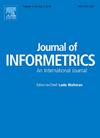Affiliation homogeneity and scientific impact: A comparative study across nations
IF 3.5
2区 管理学
Q2 COMPUTER SCIENCE, INTERDISCIPLINARY APPLICATIONS
引用次数: 0
Abstract
The crucial role of affiliation diversity in driving scientific progress is widely recognized. However, existing research did not distinguish international and domestic collaborations, overlooking the specific impact of domestic affiliation diversity on scientific breakthroughs. In this study, we utilize the Microsoft Academic Graph (MAG) dataset from 2000 to 2020 and apply the Shannon entropy to quantify diversity. While our findings indicate that domestic affiliation diversity has increased over the past two decades, contemporary science still exhibits a high level of affiliation homophily. Notably, China’s affiliation diversity remains low across different team sizes and scientific fields compared to other countries. Additionally, we observe a positive correlation between domestic affiliation diversity and citation impact in the U.S., the U.K., and Japan, with larger teams benefiting more significantly. In contrast, in China, there is a significant negative correlation between affiliation diversity and citation impact. Additionally, we find that in Chinese publications, the majority of contributions, conditional on affiliation diversity, come from a single institution. Our research sheds light on the relationship between domestic affiliation diversity and citation impact. These findings may have important policy implications for strengthening national research capabilities.
隶属关系同质性与科学影响:跨国家的比较研究
隶属关系多样性在推动科学进步方面的关键作用已得到广泛认可。然而,现有的研究没有区分国际合作和国内合作,忽视了国内合作多样性对科学突破的具体影响。在本研究中,我们利用2000年至2020年的微软学术图(MAG)数据集,并应用香农熵来量化多样性。虽然我们的研究结果表明,在过去的二十年中,国内隶属关系的多样性有所增加,但当代科学仍然表现出高度的隶属关系同质性。值得注意的是,与其他国家相比,中国在不同团队规模和科学领域的隶属关系多样性仍然很低。此外,我们还观察到,在美国、英国和日本,国内隶属关系多样性与引文影响之间存在正相关关系,团队规模越大,受益越显著。而在中国,隶属关系多样性与被引影响呈显著负相关。此外,我们发现,在中国出版物中,大多数的贡献,以隶属关系的多样性为条件,来自单一机构。我们的研究揭示了国内隶属关系多样性与被引影响的关系。这些发现可能对加强国家研究能力具有重要的政策意义。
本文章由计算机程序翻译,如有差异,请以英文原文为准。
求助全文
约1分钟内获得全文
求助全文
来源期刊

Journal of Informetrics
Social Sciences-Library and Information Sciences
CiteScore
6.40
自引率
16.20%
发文量
95
期刊介绍:
Journal of Informetrics (JOI) publishes rigorous high-quality research on quantitative aspects of information science. The main focus of the journal is on topics in bibliometrics, scientometrics, webometrics, patentometrics, altmetrics and research evaluation. Contributions studying informetric problems using methods from other quantitative fields, such as mathematics, statistics, computer science, economics and econometrics, and network science, are especially encouraged. JOI publishes both theoretical and empirical work. In general, case studies, for instance a bibliometric analysis focusing on a specific research field or a specific country, are not considered suitable for publication in JOI, unless they contain innovative methodological elements.
 求助内容:
求助内容: 应助结果提醒方式:
应助结果提醒方式:


